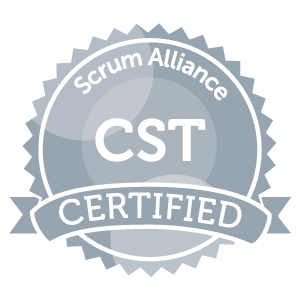

Certified Scrum Trainer® (CST®)

Why become a Certified Scrum Trainer?
Maximize your global impact by reaching more teams and organizations with one of the most in-demand agile training credentials. Link your training services to the organization that provides the scrum certifications most demanded by employers across industries.

Elevate your training career with a CST certification
Featured testimonials
CST certification standards
Certified Scrum Trainers play a vital role in the Scrum Alliance community. The following standards set the certification requirements that each CST must meet and maintain.

A CST must demonstrate deep knowledge and extensive experience with scrum concepts, practices, values, and principles.

A CST must demonstrate excellence in current training and facilitation skills and techniques.

A CST must be an active participant in the scrum and agile community.
Certification process
The CST application process consists of an online application, an interview, and a simulation.
Navigate through the online application. The application is an opportunity for you to demonstrate and describe why you are ready to be a CST.
Once your application is submitted, it goes into a queue to be prescreened by a Scrum Alliance staff specialist. The goal of the prescreen is to validate that you meet all CST prerequisites.
Once you have passed the prescreen, your application will be added to the queue for Formal Review by the Trainer Approval Community (TAC). Once approved at formal review, you'll be invited to interview.
The TAC evaluates your training abilities and thought leadership during this face-to-face interview and training simulation.
CST certification is granted when the TAC panel collectively assesses that you satisfy the certification standards and qualifications. If you are not approved, the TAC provides feedback and you may be invited to re-interview at another time.

Dates and deadlines
If you are submitting with a goal for a particular date, please reference the following candidate interview and simulation schedule and corresponding application deadlines:
September 6-8, 2024
In-person interviews and simulations at the Regional Scrum Gathering Stockholm. CST application submission deadline: May 1, 2024.
May 2-4, 2025
About the Trainer Approval Community
The goal of the Trainer Approval Community (TAC) is to provide a clear, consistent, and equitable way of obtaining the CST certification while maintaining the high-quality standards that the CST certification represents. The TAC's role is to uphold and assess the CST certification standards.
TAC members are CSTs who have been actively training for at least two years, are Scrum Alliance ambassadors in good standing, and bring to the team a diversity and uniqueness of perspective.
Relevant resources
Get agile insights: Subscribe today!
Frequently asked questions
CST stands for Certified Scrum Trainer, a certification provided by Scrum Alliance. CSTs play a vital role within Scrum Alliance, delivering inspirational scrum and agile certifications to learners worldwide.
A Certified Scrum Trainer educates and trains individuals and teams in agile principles and practices, the scrum framework, and other competencies related to the specific Scrum Alliance course. They deliver Scrum Alliance certification courses and decide whether to recommend their course attendees to Scrum Alliance for certification. Additionally, CSTs contribute to the broader agile community by staying updated with the latest trends and sharing their expertise.
You must be an active CST to teach certain courses. CSTs are entrusted to deliver Scrum Alliance's core certification courses (all courses within the scrum master track and product owner track).
Scrum Alliance has specific requirements and standards for trainers who lead these certification courses. These standards ensure that the training is consistent, high-quality, and aligns with the core principles and practices of scrum. As a CST, you'll deliver our most in-demand scrum certification courses.
Training of other Scrum Alliance courses requires a separate evaluation process.
Earning the Certified Scrum Trainer certification from Scrum Alliance can be a significant undertaking, and the time required to achieve it varies widely based on individual circumstances.
Some of the basic requirements include extensive practical experience with scrum, demonstrated expertise in scrum practices and principles, and a proven ability to teach and mentor others in the scrum framework effectively. The process is designed to ensure that CSTs have a comprehensive and deep understanding of scrum, making the timeline to certification vary from person to person.
Scrum Alliance uses a formal application and interview/simulation process to assess an applicant’s scrum experience, scrum knowledge, community involvement, and training experience. In order to apply, one must hold an active Certified Scrum Professional® - ScrumMaster (CSP®-SM) or an active Certified Scrum Professional® - Product Owner (CSP®-PO) designation from Scrum Alliance. However, there is no designated "CST course" or "CST exam" that an applicant is required to take as a prerequisite.
Co-training with an active CST is not required but is highly recommended. Successful applicants have found co-training to be an invaluable experience when piloting their course materials and practicing their facilitation style in a real-world context.
Please note that you must hold an active CSP-SM or CSP-PO certification to begin co-training with current CSTs. We recommend creating relationships with active CSTs organically, by networking at events and creating natural connections with the Scrum Alliance guides' community. Any active CST open to co-training will have indicated their intention on their Scrum Alliance profile.
Yes—Scrum Alliance welcomes those who already train or coach for another scrum-certifying body or training organization to apply to become a CST. As a Scrum Alliance CST, you are expected to focus and prioritize your teaching efforts in furtherance of Scrum Alliance’s mission in order to provide an exceptional student experience. You may not offer "two-in-one" certification courses or market your classes in a way that suggests students will receive an additional certification from a different certification body.
Please let us know if you have concerns about interviewing in English and we can discuss inviting a community translator (other Scrum Alliance certificant) to accompany you and help with translation during the interview. Please let us know if you have other concerns about providing your application personal statement(s) in English, and we will work with you to discuss options.
If you receive a Deferral Decision from the Trainer Approval Community that you believe to be incorrect, you may appeal the decision to Scrum Alliance. In that case, certain guides' community members may be selected to participate in a "Certification Appeal Committee" that reviews and considers such appeals.
An appeal must be made within 30 days of the decision. If the appeal is of a Formal Review decision, we recommend you complete a feedback call with your reviewers before submitting your appeal.
You, as the individual making the appeal, have the burden of proof. Your appeal will not be accepted for review if it does not include relevant documentation that clearly demonstrates the basis for your appeal, and that you fully satisfy all of the CST Certification Standards. Scrum Alliance staff members may participate in Certification Appeal Committee proceedings in a non-voting capacity.
The decision of the Certification Appeal Committee is made by a majority vote of the Committee members. Thereafter, the Committee informs Scrum Alliance of its decision with regard to the appeal and provides a written explanation of the basis for such decision.
If, after reviewing the General Application Appeal Process, you wish to appeal either your CST Candidate Formal Review or Interview/Simulation decision, please contact the Scrum Alliance Providers Team.
If you feel there has been a violation of the Scrum Alliance Code of Ethics, please submit the provided form.
Have additional questions?
Contact us
















-QrzVEf5ki7Ni9s9lfWg.png)
-zonm4SH0uTWeCAwZV5Zw.png)
